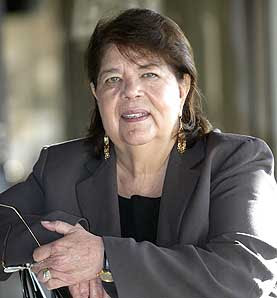
As some of you may have noticed, there was supposed to be an edition of the Disability Blog Carnival at Astrid's Journal last Thursday. It's not there, and I've emailed Astrid, but I didn't get any reply--so I'm not sure what happened, or if the edition will post at some future time. I hope Astrid is okay, and I'm sure we'll be in touch eventually and figure it all out.
In the meantime, let me say that the next edition of the Disability Blog Carnival will be hosted at Andrea's Buzzing About, with the theme "A Few of My Favorite Things," on 13 December. You can submit links for consideration at the blogcarnival.com form, or in comments here, or at Andrea's blog.
And to tide regular readers over until then, I've assembled a quick "snapshot of the weekend" carnival edition: Links and quotes from some of the feeds I read, but only from posts made this past Friday, Saturday, or Sunday, presented together without commentary, as a snapshot of the subjects swirling in the disability blogging community. Yes, I know it was a holiday weekend in the US--so there are many other bloggers out there, who were busy or traveling or couldn't get computer access with the library and office closed--but even with that limitation, there was much to read and think about:
The 19th Floor (Mark Siegel): "Is it me, or does it seem really fucked up to use the same financing scheme for both the purchase of a flat-screen TV and a three-day stay in the hospital for a burst appendix?"
A Deaf Mom Shares Her World (Karen): "Kudos to Potbelly for committing to an accessible design for all their restaurants-- even if it took a lawsuit to make it happen. Now let's see them hire people with disabilities as well!"
Andrea's Buzzing About: "Die-hard patriots will strenuously assert that the US is the 'greatest nation to live in', but the World Health Organization would beg to differ..."
Chewing the Fat (Dave Hingsburger): "Should people with disabilities who do not need a benefit turn it down? Should we have refused the free ticket and paid for Joe's seat?" [Don't miss the long comments thread on this one.]
The Gimp Parade (Kay Olson): "It's a colorful painting of an Indian woman or girl in a manual wheelchair wearing a pink and green sari and traditional Indian jewelry. The spokes of the wheelchair have "virtues" written along them..."
Keep Buggering On! (Lorraine Hershon): "This weekend I was having a cup of tea with some casual acquaintances when they suddenly said, Do you mind if we pray for you? Well what can you say to that?"
L'azile (Catherine Roy): "...it seems to me that we should not have to point out, in this day and age, that just because you use a wheelchair, that does not mean you can not think for yourself or how disheartening prejudice or lack of access can be. Don’t people get it by now?"
The Life and Times of Emma: "When the guy from the journey care booking line went 'so that’s a booking for you and your electric wheelchair to travel to Oxford…' as though my powerchair was another person."
Midlife and Treachery: "Sometimes, our lives are just too different to look across that divide of privilege and make any kind of sense."
Miss Crip Chick's Weblog: "We are taught to think disability activism means being that one token young person on every single board and committee in the country."
Pipecleaner Dreams: "...what I thought was only a problem with school is actually a problem with everything. Corey's mind works in ways that are hard to figure out. And it's probably just as frustrating at times for him as it is for me."
Pretty Good Considering (Jothy Newton): "Soldiers in Iraq have required an amputation at twice the rate compared to previous wars."
Reimer Reason (Jodi Reimer): "Kellen had a blast with his cousins. As he has gotten older, they have been playing a bigger role in his life."
Rollingpix (Ralph Raymond): "I was really stoked to get the second interview with Greg Malory after his historic, successful navigation of the Mangde Chu river in the Himalayan Mountain ranges of Tibet."
Screw Bronze (Elizabeth McClung): "See, I am finally starting to get what having an autonomic dysfunction means. It means that things just happen. Indeed, no one really knows for sure WHAT happens or why."
Through Myself and Back Again (lilwatchergirl): "I've had meetings with managers in which I've asked for reasonable adjustments that would cost nothing and bother no one, but because they're a variation on the norm, or mark me out as a different, they've been refused...."
Wheelie Catholic (Ruth Harrigan): "Like car owners, wheelchair users need regulations to ensure we get the products we need and the performance we want."
The Wood Vale Diaries (Heidi): "Now why don't you losers go back to work and instead of perving over my holiday photos, why don't you spend that time doing something useful to improve the sorry state of special educational provision in this borough." [To the Southwark Council member or members who keep visiting her blog]
Autism Vox (Kristina Chew): "As I grew older, I started to see how, for me—a third-generation Chinese American—-what was 'Chinese' and what was 'American' were often intertwined, and that being American could mean a lot more than apple pie and the Mayflower. So 'normal' has always been a flexible category for me... "
[more soon, I'm posting as the post develops, bear with me, my connection cuts in and out, it might take a while]







